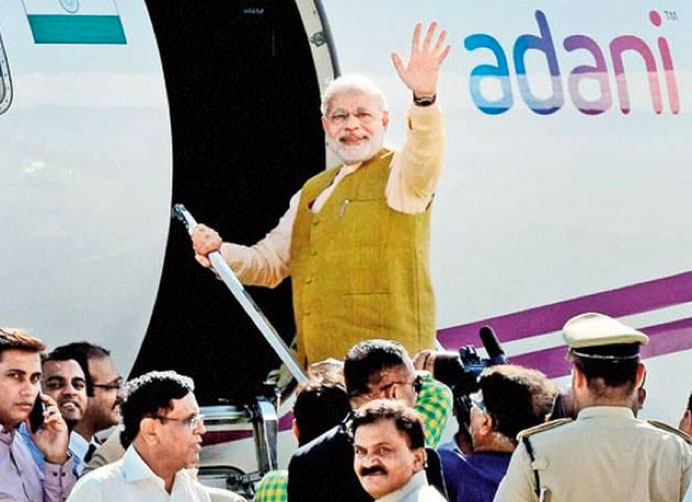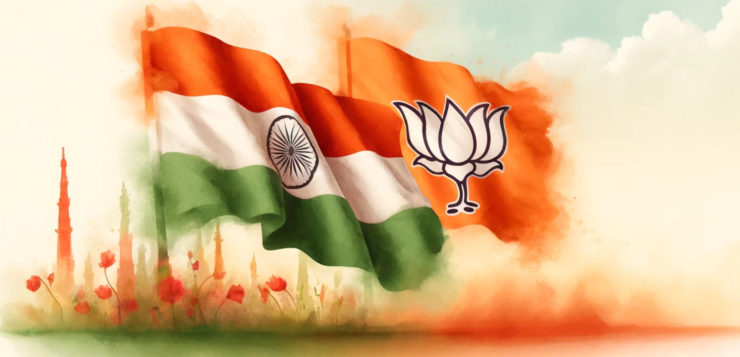Despite its perception as one of the great secular countries, India – home to the world’s largest population – is slowly being dragged closer and closer towards religious extremism, writes Shiza Ahmed Butt.
Under the tutelage of the ruling Bharatiya Janata Party (BJP), India is witnessing an unprecedented rise in systemic discrimination and religious intolerance. Far from its secular constitutional ethos, the Indian government is guilty of patronising the indoctrination of Hindutva ideology within the political and social sphere of the state.
The Hindutva movement aims to rebirth India as an extremist Hindu (rather than secular) nation.
According to an annual report released by the United States Commission on International Religious Freedom (USCIRF) in 2023, authorities within India have harassed, detained, and prosecuted multiple lawyers, journalists and activists advocating for religious freedom.
The USCIRF report recommended the US State Department “designate India as a Country of Particular Concern for its systematic, ongoing, and egregious violations of religious freedom”.
However, the credit of birthing Hindu ultranationalism and fanaticism does not fall solely upon the BJP government. In fact, the rise of Hindu fundamentalism is also a by-product of personalised secularist principles within the Indian constitution, and the strong connection between Hindus and religion.
Religious neutrality in India was constitutionalised in 1976 after the 42nd Constitutional Amendment Act. It stipulated that the Indian state must be devoid of religion, but did not call for a strict separation of religion from politics. In other words, as coined by Rajeev Bhargava, there was to be a “principled distance” between state and religion. However, the ambiguity surrounding the scope of this distance has allowed the Indian government to exploit and mould the principles of secularism to fulfil its political and ideological aspirations.
Over the years, governments have interpreted the extent of this distance based upon its opportunistic value. The BJP government, for example, constantly appears to be juggling between theocratic and secularist principles based on what serves its interests at any given moment.
Globally, the BJP government wishes to consolidate the country’s secular identity. Promoting itself as a state upholding the principles of liberty, equality and neutrality allows it to stoke communal hatred and bigotry without accountability. In other words, Prime Minister Narendra Modi is using India’s secular identity to appease the international community, while tacitly indulging in systemic discrimination and fanatic patriotism.
On the other hand, Modi’s regular interference in religious matters and boosting of Hindu nationalist sentiment allows him to hijack votes from Hindu supremacists while also shrouding the failures of his government.
According to a report published by the Hindutva Watch, “There were 255 documented incidents of hate speech gathering targeting Muslims… About 70% of these incidents occurred in states scheduled to hold elections in 2023 and 2024.” In short, as per Prime Minister Modi’s interpretation of “principled distance”, fundamentalist ideologies are not only a routine element in Indian politics, but also a medium to promote party interests.
Indian secularism is based upon the co-existence of state and religion; however, the constitution fails to reveal in detail the true nature of this relationship. It allows the state to intervene in religious practices for the purpose of social reform under certain circumstances. These circumstances being open to personal interpretation have allowed the BJP government to engage in the reformation of religious laws, including the “12-state level Anti-Conversion Law” and the Citizenship Amendment Act that candidly discriminates against Muslims.
These facts lead one to believe that Hindu nationalism is thriving under the camouflage of Indian secularism. The celebrated uniqueness of Indian secularism that stresses equal tolerance of all religions has, time and again, failed to hold the government accountable for indulging in iniquitous acts of discrimination.

In contrast, the constitution has given sufficient leeway for the state to interfere in religious affairs in accordance with what they think serves the “public interest”.
Article 25 Clause 2 of the Indian constitution explicitly lays out that the state holds the authority to make any new laws “regulating or restricting any economic, financial, or political activity which may be associated with religious practice”. That being said, the constitution gives legitimacy to the government to intervene in religious matters in the name of socio-economic reform. In the case of Modi, the socio-economic reform being the empowerment of religious factions aiding the conversion of India into a nationalist state at the expense of its minorities.
Additionally, the Hindu community shares an immutable relationship with religion. According to a report published by the Pew Research Centre, “nearly 64% of Hindus believe it is important to be Hindu to be truly Indian”. These beliefs are reflected within the political arena with the vast majority of the more extremist Hindu population voting for BJP in hopes of furthering their religious agendas.
Research shows that “60% of Hindu voters who believe it is important for a Hindu to be Indian cast their vote for BJP”. In short, with their religious and national identity being so closely intertwined, Hindus can’t showcase pluralism and religious neutrality at both the societal and political levels.
Thus, Indian society can never truly be secular. The constitution pays lip service to religious co-existence but fails to mend the religious fault lines that shake the very foundation of India’s existence as a secular state.
On the other hand, the ethno-nationalist government continues to candidly discriminate against Indian minorities and polarise Indian society to build its army of religious fanatics. These actions have triggered a chain reaction within an already aggravated Hindu nationalist population who are now working more fervently than before to cripple the minorities.
New Delhi’s secular culture is damaged beyond repair. The well-intentioned yet ill-fitted attempt to secularise a country fuelled by religious ideology has failed. Presently, it is waging a “divinely guided” war against its minorities to build a Hindu state and appears to be succeeding at it.
The forthcoming elections will play a significant role in determining the future of India as a temporal state. The re-election of BJP may eventually foment India’s metamorphosis from a secular to a Hindu state, but for now, the ambivalent state will continue to juggle between its two identities.
Donate To New Matilda
New Matilda is a small, independent media outlet. We survive through reader contributions, and never losing a lawsuit. If you got something from this article, giving something back helps us to continue speaking truth to power. Every little bit counts.




